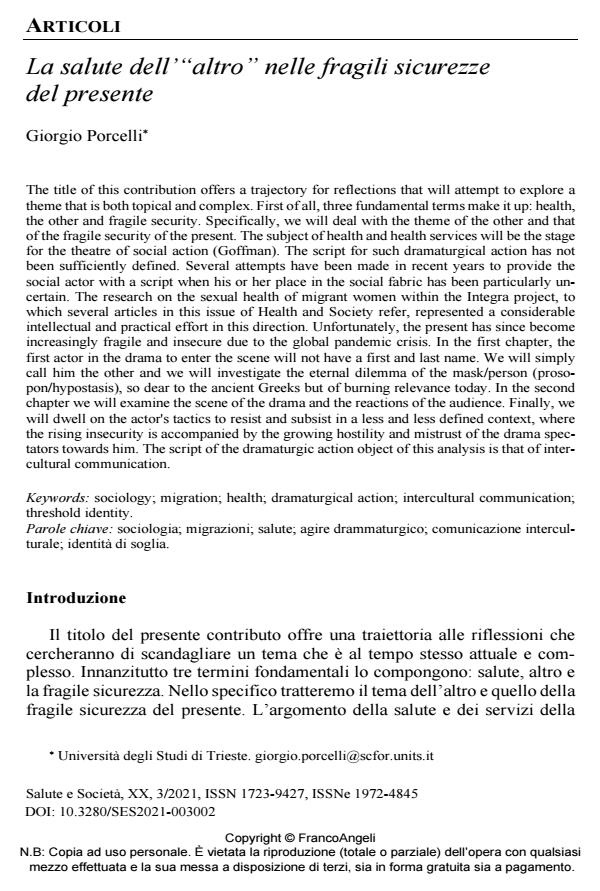La salute dell’"altro" nelle fragili sicurezze del presente
Journal title SALUTE E SOCIETÀ
Author/s Giorgio Porcelli
Publishing Year 2021 Issue 2021/3
Language Italian Pages 18 P. 9-26 File size 245 KB
DOI 10.3280/SES2021-003002
DOI is like a bar code for intellectual property: to have more infomation
click here
Below, you can see the article first page
If you want to buy this article in PDF format, you can do it, following the instructions to buy download credits

FrancoAngeli is member of Publishers International Linking Association, Inc (PILA), a not-for-profit association which run the CrossRef service enabling links to and from online scholarly content.
The title of this contribution offers a trajectory for reflections that will attempt to explore a theme that is both topical and complex. First of all, three fundamental terms make it up: health, the other and fragile security. Specifically, we will deal with the theme of the other and that of the fragile security of the present. The subject of health and health services will be the stage for the theatre of social action (Goffman). The script for such dramaturgical action has not been sufficiently defined. Several attempts have been made in recent years to provide the social ac-tor with a script when his or her place in the social fabric has been particularly uncertain. The research on the sexual health of migrant women within the Integra project, to which several articles in this issue of Health and Society refer, represented a considerable intellectual and practical effort in this direction. Unfortunately, the present has since become increasingly frag-ile and insecure due to the global pandemic crisis. In the first chapter, the first actor in the dra-ma to enter the scene will not have a first and last name. We will simply call him the other and we will investigate the eternal dilemma of the mask/person (prosopon/hypostasis), so dear to the ancient Greeks but of burning relevance today. In the second chapter we will examine the scene of the drama and the reactions of the audience. Finally, we will dwell on the actor's tac-tics to resist and subsist in a less and less defined context, where the rising insecurity is ac-companied by the growing hostility and mistrust of the drama spectators towards him. The script of the dramaturgic action object of this analysis is that of intercultural communication.
Keywords: sociology; migration; health; dramaturgical action; intercultural communication; threshold identity.
Giorgio Porcelli, La salute dell’"altro" nelle fragili sicurezze del presente in "SALUTE E SOCIETÀ" 3/2021, pp 9-26, DOI: 10.3280/SES2021-003002